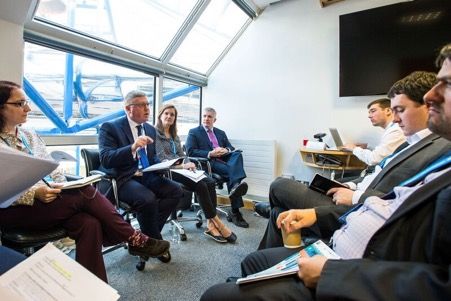In early October, Prospect convened a panel of experts and politicians at the Conservative Party’s annual conference to discuss the future of transport in an age of devolution. This is what we learned:
- How to create capacity (part 1)
For Laura Shoaf, managing director of Transport for West Midlands, one of the biggest challenges she faces is working out how to free up space. “Our network is at complete capacity,” she said. “There’s no resilience left.” This is where digital technologies come in. “We need to change the way people travel and the choices that they make. The best way to do that is to give them options, give them information.” In common with other urban centres, rush-hour trains into central Birmingham are “absolutely packed” while at 9.05am “you could actually lie down across the seats,” Shoaf noted. “We need to incentivise people and businesses to allow staff to travel in a different way at a different time.” By providing live and predictive travel data, regions like the West Midlands hope to nudge those on roads, buses or trains to make informed decisions that will smooth traffic peaks and troughs. “Our responsibility as a transport authority is to co-ordinate, to make our data accessible and then, in a very real way, to get out of the way.”
- Transport infrastructure must pass the “zebra crossing test”
Donna Jones leads Portsmouth City Council. Her city has multiple transport challenges: poor rail links, an underused waterway and a motorway linking Portsmouth to Southampton that’s more like a commuter road (and a slow one at that). She believes devolution is “absolutely key” to addressing these infrastructure challenges and thinks the answer lies in smart and intelligent transport solutions. “Data is the smart way to change behaviours,” she said. Data is also essential in determining how new or improved transport services will be used. “It’s like putting a zebra crossing in,” said Jones. “You don’t put it in where it’s easiest from build point of view.” Why? Because it won’t get used. Instead, you put it at the “natural crossing point.” The same principle applies to all infrastructure decisions. Use data to understand behaviour, not just change it.
- Three steps to create a smart city
Mark Prisk, MP for Hertford and Stortford and chair of the Smart Cities All Party Parliamentary Group, thinks that technologists sometimes take the wrong approach to problem solving. “’Hey, I’ve got a great piece of kit. Now, is there a problem that it can solve?’” Smart Cities, by contrast, demand we address “how we can make our cities work better for the people who live there—living, working and getting around.” He says there are three keys steps to delivering on the promise:
- Open data. “You have to be willing to open up data,” he said, citing Boston as an exemplar. “We’re not going to solve planning, transport and economics unless planning, transport and economics departments talk to each other.”
- Cede control. It requires, says Prisk, a “cultural shift” from the traditional command and control approach. “It’s very difficult for us as politicians to accept that we will need to share power,” Prisk conceded.
- Engage citizens. This is more than consulting the local population on policy decisions already taken. It means involving them in defining policy priorities in the first place.
- Data is infrastructure
“We rely on it. If data disappeared we’d notice.” So said Jeni Tennison, chief executive of the Open Data Institute making the case that data is not just used to inform infrastructure decisions, it is actually infrastructure in its own right. “It’s part of what influences what we do. It enables innovative services to be created, not just services like CityMapper but services that operate in the real world, like Uber.”
- How to create capacity (part 2)
Jason Pavey, market director, local transport, Atkins calls it “total transport.” It demands joined-up thinking. How, for example, might a city co-ordinate health and education transport? On any given day there will be periods when buses, ambulances and minibuses will be idle. If a city can harness that spare capacity, services will improve and costs will be driven down. “With technology, data and intelligent mobility you can start to see how we might join things up,” said Pavey.
![zip55]()
- Our relationship with our data is in flux
“Some data should be closed, it’s private and should not be available to everyone,” said Jeni Tennison. “Some data should be shared with trusted third parties, for example for research purposes so we get best value out of that data without infringing on peoples’ privacy. And some data should be open because it provides such insight—and such building blocks that people can develop on top of.” These distinctions between closed, shared and open matter if citizens are going to trust policy makers with their data. “Lots of the data that would help us make better decisions is personal data,” Tennison noted—offering Oyster cards, fitness app Strava and Uber as examples—and it will take time before society works out what constitutes acceptable data use and what doesn’t. “Yes, legislation will have a role but it’s much more to do with social mores and codes,” said Mark Prisk. “One of the roles of government is to help people come to as good and as informed decisions as they can rather than dictating and legislating.”
With the support of Atkins, Prospect hosted a panel discussion at the 2016 Conservative Party Conference on smart cities and intelligent transport in an era of devolution which took place on Monday 3rd October in Birmingham. The discussion was chaired by Jon Bernstein, Associate Editor for Prospect. Speakers included: Jason Pavey, Local Transport Director, Atkins; Mark Prisk MP, Member, Communities and Local Government Committee and Chair, Smart Cities APPG; Donna Jones, Leader, Portsmouth City Council; Laura Shoaf, Managing Director, Transport for West Midlands (TfWM); and Dr Jeni Tennison, CEO, Open Data Institute (ODI).For speaker and partnership opportunities, please contact david.tl@prospect-magazine.co.uk.













